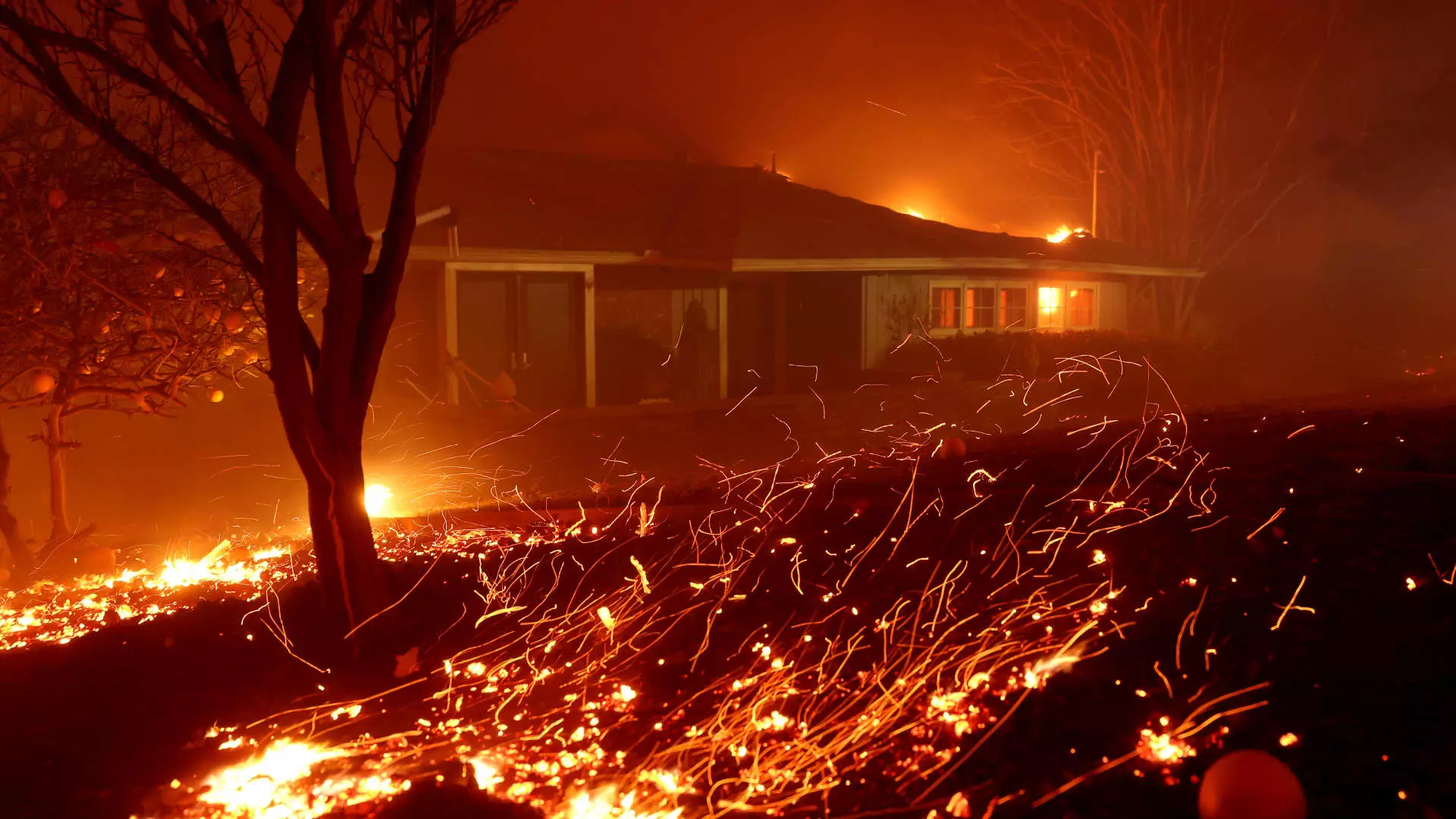As climate change becomes an undeniable reality, its repercussions are beginning to manifest in ways that experts have long warned about. The recent wildfires in Los Angeles serve as a harrowing reminder that environmental factors can drastically influence not just our ecosystems, but also our economies—particularly the real estate market. While the direct financial impact from these wildfires remains uncertain, a consensus is emerging among analysts: the repercussions are set to reverberate far beyond California, likely resulting in increased insurance costs that will affect property values nationwide.
According to research conducted by First Street, a climate-risk analysis firm, an alarming projection reveals that by 2055, approximately 84% of homes in the United States could face declining value due to climate volatility. When aggregated, these losses are estimated to reach a staggering $1.47 trillion. Jeremy Porter, a prominent figure in climate risk research, has articulated the gravity of the situation, underscoring that climate change is now a concrete force reshaping real estate markets across the nation.
One of the most immediate and significant consequences of this shift is the expected rise in insurance premiums—estimated to increase by, on average, 25% over the next three decades. Of this increase, 14% reflects a current underappraisal of risks, while an additional 11% is attributed to the escalating threat posed by climate change itself. Nationally, this results in a moderate average property value decline of about 3%. However, certain geographic areas, particularly in Texas, Florida, and Louisiana, could be hit much harder, with some home values at risk of being halved.
Dave Burt, founder of DeltaTerra Capital, has raised alarms about the vulnerability of the real estate market. He posits that in the coming five years, around 20% of homes in the U.S. will see some form of devaluation due to climate-related risks. This portrayal is stark, especially when Burt draws parallels between the current climate-driven financial vulnerability and the subprime mortgage crisis that shocked the economy two decades ago.
Warnings about the potential crisis are not confined to financial experts but resonate within political circles as well. Senators like Sheldon Whitehouse have voiced concerns about the imminent risk posed to the insurance industry, forecasting an economic collapse stemming from rising insurance costs. He underscores that the destruction caused by the LA wildfires is only amplifying a more widespread dilemma. “You can’t get mortgages; you can’t sell properties at value,” he stressed, highlighting the growing disconnection between asset values and market realities, influenced heavily by climate vulnerability.
The acceleration of climate-related disaster risks is unfolding at a rate that outpaces prior expectations. Experts like Ben Keys from the Wharton School emphasize that a recalibration of asset values is essential for market equilibrium. As foreclosures rise in climate-affected areas—the aftermath of Hurricane Sandy saw a staggering 46% increase in foreclosure rates—the financial strain on homeowners intensifies. The local mortgage markets are indeed taking heed of these emerging risks; however, interventions from major institutions like Fannie Mae are lagging in addressing these challenges comprehensively.
Fannie Mae’s chief climate officer has acknowledged that the nuances of climate risk currently remain inadequately integrated into their underwriting practices. This disconnect leaves consumers unaware of the impending insurance premium hikes they might face, limiting their ability to plan for the future effectively.
In this environment of burgeoning risks, pathways to mitigate these challenges are gaining traction. DeltaTerra is at the forefront of guiding investment strategies that incorporate these risks. By assisting clients in aligning their investments with understood climate-related roadmaps, they are proactively addressing potential financial fallout.
However, rising insurance rates are only one aspect of the multi-faceted challenges that homeowners may face. Local governments might undertake tax hikes to fund resilience measures, escalating maintenance and energy costs associated with homes. Yet despite these rising challenges, policy shifts at the federal level, such as the decision to halt the Federal Flood Risk Management Standard, suggest a troubling lack of foresight in preparing for future climate threats.
The intricate relationship between climate risks and the real estate market is a new reality that demands attention. Individuals, communities, and policymakers now face the urgent task of recognizing this evolving landscape. As insurance premiums climb and economic vulnerabilities deepen, proactive measures must be taken to prepare for and mitigate these threats. The urgency for awareness and action becomes paramount in this climate crisis, not just for localities like Los Angeles, but for every community across America grappling with the realities of a changing environment.

Leave a Reply